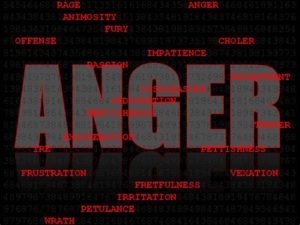
Anger, though disguised as many emotions,
is the base emotion of sinful covetousness
The world system {Lost} has a difficult task to define anger, condemn anger but at the same time use anger to justify its hostility toward the saved of God. The major reason the world cannot bring itself to condemn Islamic wrath against Christians is that the world hates the truth of God. Muslims become the unwitting tool of the World until they are no longer useful.
However, this post is not about institutionalized or governmental anger and violence for the reason that this begs the question of what is anger and how can anger be controlled. Institutionalized or governmental entities are not living beings but are comprised of living, sinful people the majority of which are not saved. Therefore, these people are not only in the World but they are of the World. Therefore, this post will speak to the issue of anger on the individual level.
There is a proper expression of anger. God is angry when people refuse to perform what is reasonably required of them to obtain true life eternal (Ro 12:1-3). The Lost are in a constant state of rebellion against God and refuse His grace of life (Ro 3:10-18). Those saved but trapped in the throes of immaturity remain enmeshed in the expressions of fleshly sins (He 5:11-14). Christ expressed Godly anger twice in His ministry: both times against the Temple excesses (Jo 2:13-17; Mt 21:12-13). And people can express Godly anger also as demonstrated by Peter against Simeon who wanted to buy the power of the Spirit (Ac 8:14-24) and by Paul who blinded the Wizard who sought to constrain the Gospel message (Ac 13:4-12). While these expressions of Godly anger may result in the World expressing its anger, this is not the anger people usually express. The anger people usually express is best illustrated in Proverbs (Pr 27:4).

World’s Definition of Anger is Non-Existent
It’s solutions target the sinful self: Failure
What is anger? The Law of Identity demands a clear definition. The Bible provides such a definition while the World provides a shifting, nebulous understanding that morphs to meet current requirements. In Psychology Today (Dealing with Anger) there is no definition of anger. At best it is described as a basic emotion therefore the assumption is that everyone knows what anger is; this leads to the logical fallacy of Equivocation, constantly shifting definitions based on the needs of the argument.
The Bible defines anger as the internal conflict of unfulfilled desires or simply as covetousness (Ja 4:1-4). Each person experiences anger because he, or she, covets something they do not have but possessed by someone else, or so one believes. James in his bluntness says this forms the basis for two outcomes: (1) Murder and (2) Identifying with the World which pits one against God. This Law of Excluded Middle is constantly demonstrated in the Bible. One is either Lost, in and of the World, or one is Saved, in but not of the World and therefore hated by the World (Jo 17:14).

While Admitting Anger is Destructive
World Worships Anger as Savior
Lest one believes James is alone in equating anger with murder Christ made the case that one of the Ten Words, Do not Murder, had as its basis the emotion of anger (Mt 5:21-26). Christ quoted the Word then proceeded to explain that murder did not spring suddenly into existence but was the end result of uncontrolled anger. The use of bullying (Gr: raca {insults}) and degradation (moros {moron}) against those who are weaker and thus in need {Brother or Neighbor: Lk 10:25-37} eventually results in murder. Still not convinced? Let us look at the first example of anger in the Bible.

Anger not only destroys the practitioner
It destroys the possessor of what is desired
By no small coincidence, the first murder of the Bible is also the first person to exhibit anger: Cain (Ge 4:3-10). Cain, raised to be the messiah and defeat Lucifer, was rejected by God in favor of his worthless brother, Abel. His deep rage was clearly visible on his face as well as controlling his mind. God talked to Cain telling him he must control his sin and he would be accepted if he did well. This was clearly an invitation for Cain to realize his inherent weakness to control sin and follow the example of Abel and be accepted by God {saved}. However, Cain took the sinful route and the one bred to protect people from Satan became the tool of Satan to terrorize people. He murdered Abel because he coveted Abel’s relationship with God which he did not possess. Though Abel was physically removed from the World, he is with God for eternity. However, Cain remained separated from God, never sought forgiveness, went to live with and rule over others who had also rejected God {Land of Wanderers: Nod} and established the first government with himself as head, I am sure (Ge 4:16-22).
What else does the Bible say about anger? “A man without self-control is like a city broken into and left without walls” (Pr 25:28). Cain certainly did not show self-control. He could not because self-control is not a learned behavior; it is a fruit of the Spirit and thus inherent in the Saved who grow in grace (Ga 5:22-24). Without self-control anger only engenders more strife and sin resulting in increasing violence (Pr 29:22). What can the Christian do about personal anger?
The Christian must embrace one’s powerlessness. We are sheep and have no power to effect change; in fact, we cannot even control ourselves (Ro 7:14-21; Ga 5:17). The fact that the Christian sinful anger demonstrates his, or her, spiritual immaturity even if one seeks biblical goals! God does not achieve His goals using unrighteousness (Ja 1:13-16). God did not even incite rebellion among the Hebrews when He desired to separate them from Egypt. He challenged the man-god, Pharaoh, to a demonstration of who is the true God. Pharaoh sent the Hebrews forth when his powerlessness was revealed (though he later repented of this). Instead, we are to exhibit the patience of Christ {fruit of the Spirit} recognizing that God is in control and all will reap what they sow; especially Christians (Pr 19:11; Ga 6:7; 1Pe 4:17).
However, one of the fundamental reasons Christians have anger issues, other than rejecting mature growth in the Scriptures via the teaching of the Spirit, is that they neglect to correct their sin and pietistically seek to correct the lost in order to build God’s kingdom on earth; a goal God will accomplish Himself in the Millennial Kingdom dispensation (Mt 7:1-5). By refusing to deal with our sin we seek to escape the punishment of God by revealing to Him others more sinful than ourselves (Ro 2:1-11). Thus, while claiming to be doing God’s will we are actually doing the work of Lucifer who was a liar and murder from the moment he sinned (Jo 8:44). IF we are children of Christ, why are we doing the deeds of Lucifer from whom we have been set free by the death of Christ for sin (Ro 6:5-18)? Because we become frustrated with the seemingly increasing power of the World and the rejection of the Gospel by loved ones. In other words, our faith weakens as we take our eyes from Christ and sink into the morass of sin from which He saved us. It dishonors Christ while it serves no good purpose but to give the lost justification to continue their self-destructive hatred of God. I too suffer from this sin; especially as I discern that much of what we think we knew of history has been misrepresented to promote an ever more intolerant globalization agenda that delights in the increasing murder of Christians; and may come to each of us also. Each of us must rest in Christ, trusting that He will do all He promised and we will be with Him in eternity regardless of what the World may do to us here; like Cain did to Abel (Re 6:9-11).
